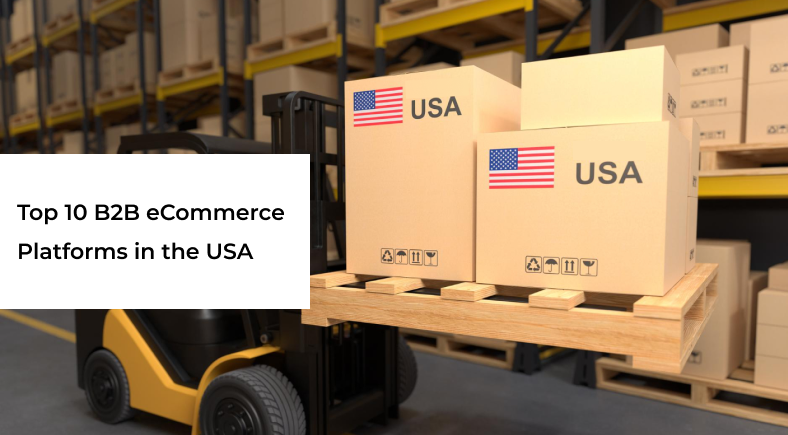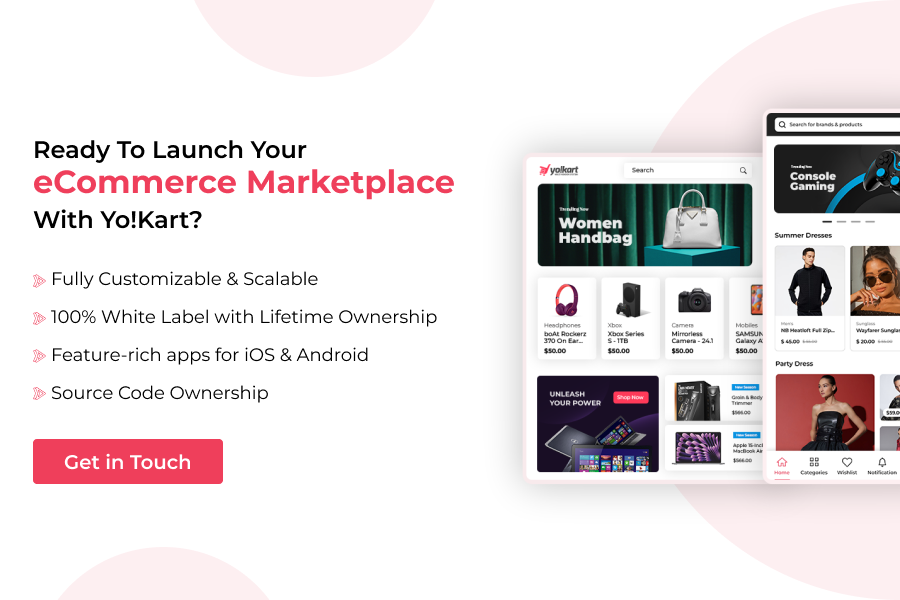Published Date 04 Nov, 2025
The B2B eCommerce industry in the United States is experiencing an explosive transformation. With digital-first buying behavior becoming the new norm, businesses are rapidly adopting online platforms to manage bulk orders, streamline supplier relationships, and automate operations.
According to reports by Statista, the U.S. B2B eCommerce market is expected to generate over 3 billion dollars sales by 2027. This rapid growth is driven by digital procurement and wholesale marketplaces, meaning companies can no longer rely solely on traditional sales channels. They need scalable, tech-driven platforms to stay competitive.
Whether you’re a wholesaler, manufacturer, or enterprise distributor, choosing the right B2B eCommerce platform can make all the difference. In this guide, we’ll explore the top B2B eCommerce platforms in the USA, their key features, pros, and cons.
Table of Contents
What is a B2B eCommerce Platform?
A B2B (Business-to-Business) eCommerce platform is a digital system that allows businesses to sell products or services directly to other businesses online. Unlike B2C platforms that target individual consumers, B2B systems cater to bulk purchasing, tiered pricing, quotation requests, custom catalogs, and multiple user roles within organizations.
A robust B2B eCommerce platform typically includes:
- RFQ (Request for Quote) and negotiation workflows
- Customer-specific pricing and discounts
- Corporate accounts with multiple buyers
- Inventory and order management
- Payment flexibility (credit limits, net terms, etc.)
In essence, a B2B eCommerce platform is not just a storefront, but a complete ecosystem designed to handle complex business operations efficiently.
Further, let’s explore the top B2B eCommerce Platforms in the USA.
Top 10 B2B eCommerce Platforms in the USA
The U.S. B2B eCommerce software landscape is rich with solutions catering to different business models, from SaaS-based platforms for quick setup to fully customizable self-hosted systems built for scalability.
Below are the 10 best B2B eCommerce platforms in the USA, ranked for functionality, customization, and overall business value.
1. Yo!Kart – Best Overall B2B eCommerce Platform for Marketplaces
Yo!Kart stands out as a purpose-built, self-hosted B2B and multi-vendor marketplace software designed to help businesses build scalable, secure, and fully customizable B2B ecosystems. It empowers entrepreneurs and enterprises to launch feature-rich marketplaces with complete ownership and zero recurring fees. With full source code ownership and a lifetime license, enterprises and startups gain complete control over customization, hosting, and long-term growth without recurring fees. Hence, it’s an ideal choice for businesses aiming to create a robust, scalable digital marketplace ecosystem.
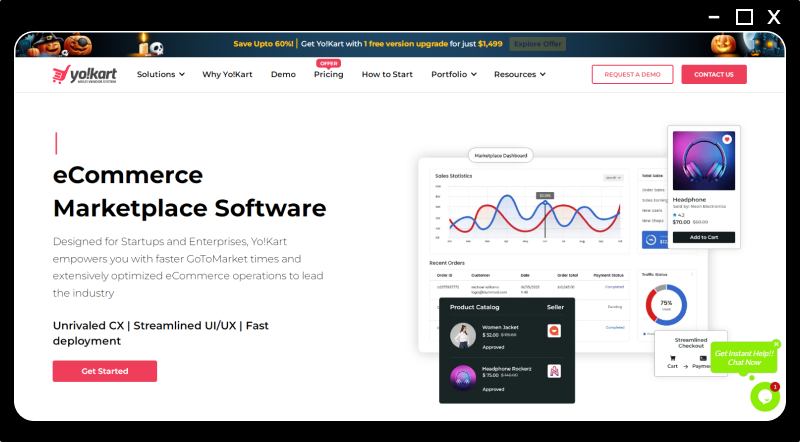
Key Features:
- Advanced RFQ (Request for Quote) module
- Tier-based pricing and MOQ (Minimum Order Quantity)
- Multi-vendor & multi-storefront management
- Custom buyer groups and catalog restrictions
- Multi-language, multi-currency, and tax management
- Source code ownership with a lifetime license
Best For: Enterprises and startups aiming to launch a B2B marketplace with full customization control and scalability.
Schedule a Free Personalized Demo to see Yo!Kart in Action?
2. Shopify Plus
Shopify Plus is the enterprise version of Shopify, designed to handle high transaction volumes and global operations. It’s a fully hosted SaaS solution that simplifies store setup but offers limited backend flexibility for complex B2B workflows. However, recurring payments add to the cost, and compared to other platforms, customization options are more limited.
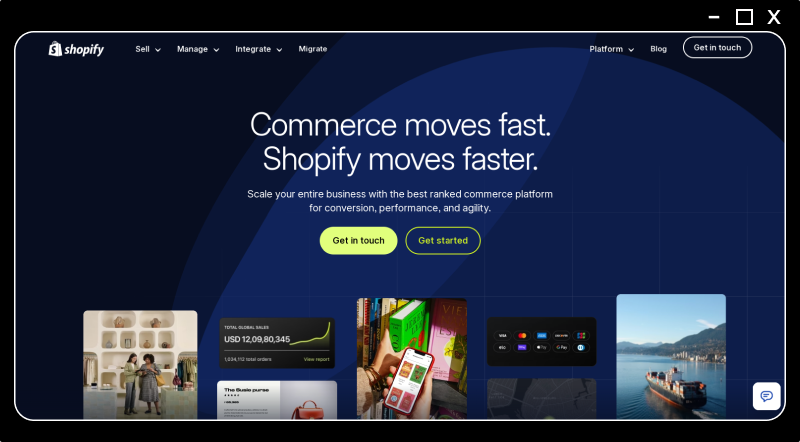
Key Features:
- Easy setup and intuitive interface
- Multi-channel sales support (Amazon, eBay, social)
- Integration with ERP and CRM tools
3. BigCommerce B2B Edition
BigCommerce B2B Edition offers a cloud-based eCommerce framework tailored to wholesalers, manufacturers, and distributors. It combines scalability with essential B2B tools such as corporate accounts, quote requests, and custom pricing. Additionally, some advanced B2B features, such as quoting, complex purchase workflows, and more, require third‑party apps, which raises integration complexity and cost.
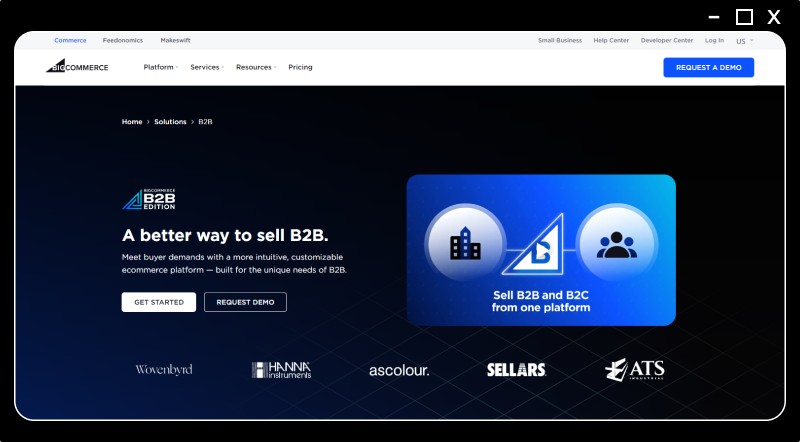
Key Features:
- Advanced pricing and catalog segmentation
- Corporate buyer management
- Integration with major ERP systems
4. Adobe Commerce (Magento)
Formerly Magento, Adobe Commerce is a highly flexible, open-source solution ideal for enterprises needing deep customization and complex workflows. It offers customization through API-driven integrations, allowing businesses to create tailored experiences for corporate clients, manage inventory at scale, and automate B2B processes. However, implementation and maintenance are resource‑intensive, with a high total cost of ownership and steeper technical demands.
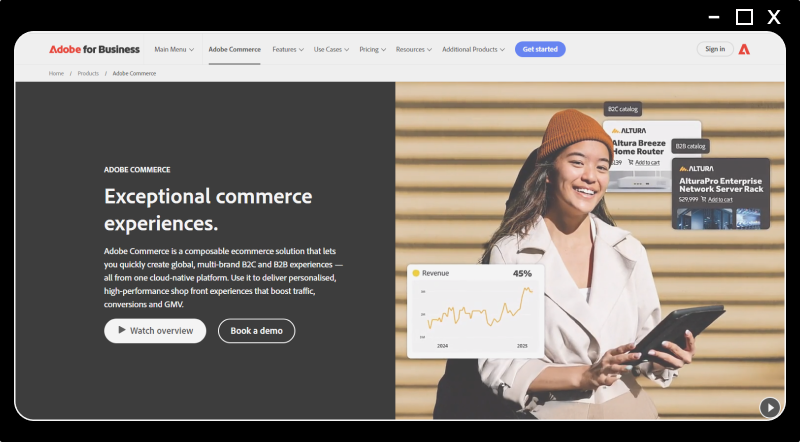
Key Features:
- Multi-store and multi-language capabilities
- API-driven integrations
- Advanced pricing and catalog rules
5. OroCommerce
OroCommerce is a B2B-specific open-source platform built for complex enterprise needs. It provides workflow automation, corporate account management, and robust CRM integration. Designed for complex B2B use cases, it has a steep learning curve, longer rollout timelines, and higher infrastructure demands.
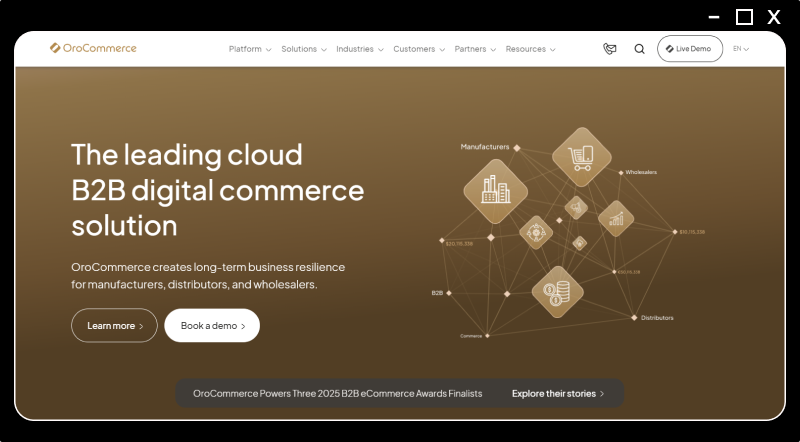
Key Features:
- Corporate account hierarchies
- Advanced user roles and access control
- Built-in OroCRM for relationship management
6. WooCommerce B2B
WooCommerce, built on WordPress, can be extended using B2B plugins to handle wholesale sales. It’s cost-effective and provides a straightforward solution for managing smaller-scale digital wholesale operations, but less suited for high-scale B2B marketplaces. Moreover, it requires many plugins for full B2B functionality, which can lead to performance, security, and scalability issues.
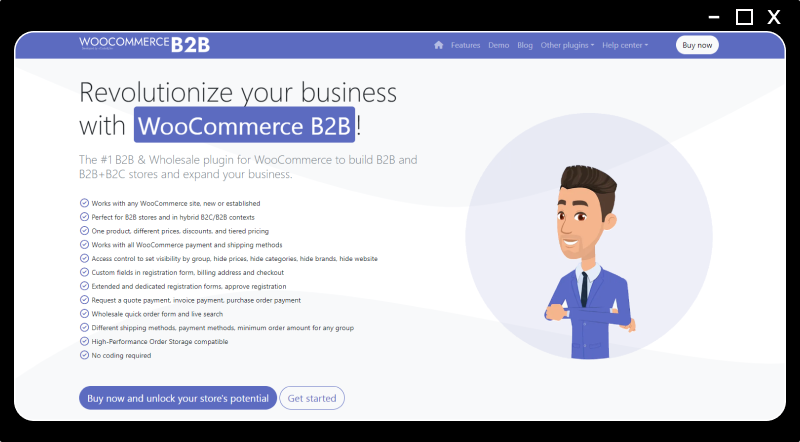
Key Features:
- Quick setup with B2B extensions
- Tiered pricing and bulk order management
- Integration with the WordPress ecosystem
7. NetSuite SuiteCommerce
NetSuite SuiteCommerce, part of Oracle’s NetSuite ERP ecosystem, combines ERP and eCommerce capabilities in a single platform. It offers deep integration between online sales and backend business operations. It manages end-to-end operations, from procurement to fulfillment, while gaining insights into customer behavior and operational performance.
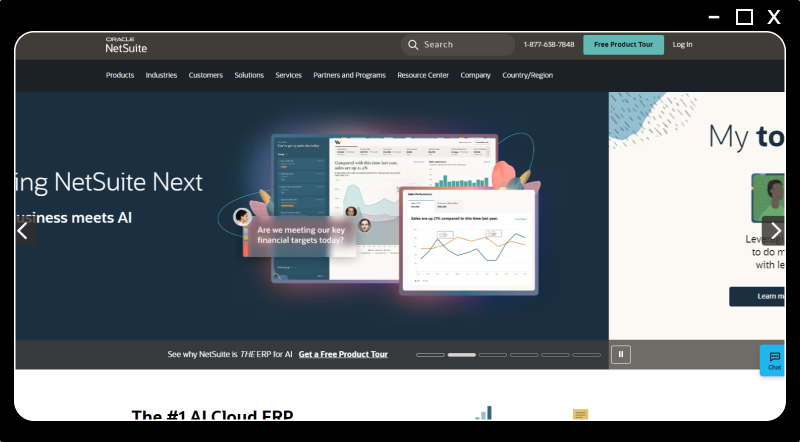
Key Features:
- Unified ERP and eCommerce system
- Real-time inventory and order management
- Support for multiple brands and channels.
8. SAP Commerce Cloud
SAP Commerce Cloud (formerly Hybris) is a robust enterprise-grade solution known for handling complex B2B operations, procurement workflows, and multinational commerce. It provides centralized product and content management, AI-driven personalization, and advanced pricing capabilities. However, it requires significant technical expertise and resources to implement and maintain.
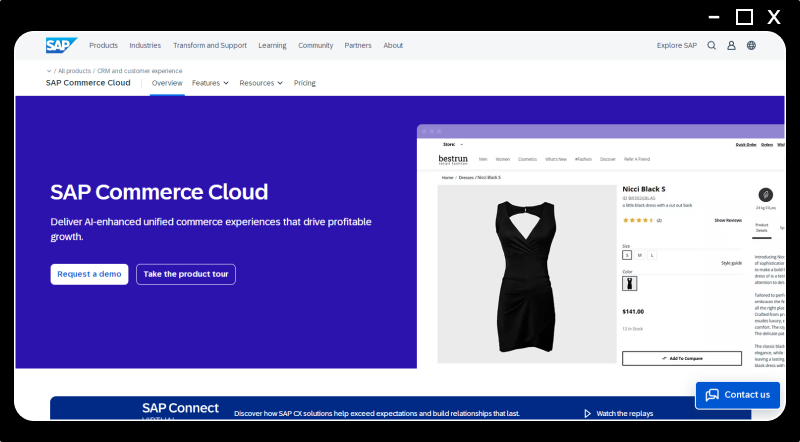
Key Features:
- Centralized product and content management
- Built-in personalization and AI-driven recommendations
- Advanced integration with SAP ERP and CRM
9. Mirakl
Mirakl is a cloud-based marketplace solution built for enterprises that want to operate third-party B2B or B2C marketplaces.. Ideal for businesses aiming to operate large, multi-vendor digital ecosystems with minimal manual intervention, Mirakl integrates with major ERP and CRM tools. However, it is important to note that setup can be time‑consuming and complex, especially when integrating with existing systems.
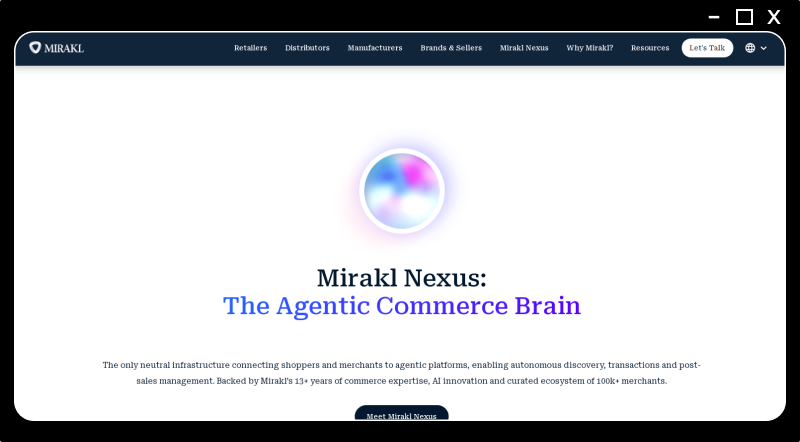
Key Features:
- Marketplace orchestration for multiple sellers
- Automated onboarding and vendor payout systems
- High scalability for global operations
10. Elastic Path
Elastic Path offers a headless commerce platform that decouples the front end from the back end, allowing businesses to create custom, API-driven digital commerce experiences. Its composable architecture supports integration with diverse technologies, allowing businesses to create unique workflows, pricing models, and storefronts. Although its API‑first and headless architecture offers flexibility, but often demands heavy developer involvement and lacks intuitive tools for non‑technical teams.

Key Features:
- Composable commerce architecture
- Headless API integrations
- Freedom to use custom frontend technologies
Comparison: Best B2B eCommerce Platforms
| Platform | Type | Best For | Customization | Recurring Fees | Marketplace Support |
| Yo!Kart | Self-Hosted | B2B Marketplaces | Full | No | Yes |
| Shopify Plus | SaaS | Fast Launch B2B | Limited | Yes | No |
| BigCommerce B2B | SaaS | Mid-sized Wholesalers | Moderate | Yes | Partial |
| Adobe Commerce | Open Source | Enterprises | High | Optional | Add-on |
| OroCommerce | Open Source | Complex B2B Workflows | High | Optional | Add-ons |
| WooCommerce B2B | Plugin-Based | Small Wholesalers | Moderate | Add-ons | Partial |
| NetSuite SuiteCommerce | ERP + Commerce | Large Enterprises | Moderate | Add-ons | Partial |
| SAP Commerce Cloud | Cloud | Global Corporations | High | Yes | Add-on |
| Mirakl | SaaS Marketplace | Enterprise Marketplaces | Limited | Yes | Native |
| Elastic Path | Headless | Custom Enterprise Commerce | High | Optional | Add-on |
Choose a Platform that Fits Your Business Requirements
How to Choose the Right B2B eCommerce Platform
Selecting the right B2B eCommerce platform is a critical decision that defines your marketplace’s long-term scalability, customer experience, and operational efficiency. With so many platforms available and each promising flexibility, speed, or affordability, – it’s important to evaluate your options based on your business model, growth ambitions, and technical needs.
Hence, below are the key factors you should consider before finalizing your B2B eCommerce software:
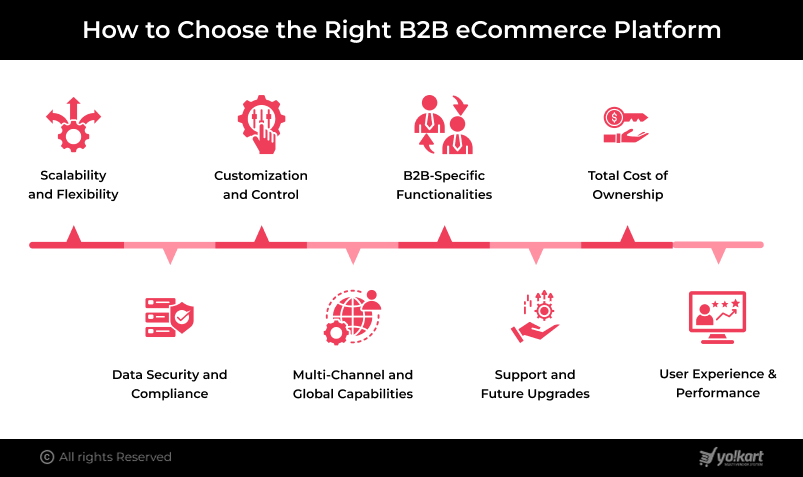
1. Scalability and Flexibility
Your platform should grow with your business. As order volumes increase and vendor networks expand, scalability becomes essential. Choose a system that supports:
- Unlimited vendors and product SKUs
- High-traffic handling without performance lag
- Easy integration with new modules and APIs
Self-hosted platforms like Yo!Kart offers unmatched scalability because it can be customized to meet both current and future business demands, without recurring SaaS limitations.
2. Customization and Control
Every B2B business operates differently. Whether it’s unique pricing structures, custom catalogs, or workflow automation, your platform must adapt to you, not the other way around.
Thus, opt for solutions that:
- Offer access to the source code
- Allow modification of core features and UX
- Support integration with ERP, CRM, and accounting systems
Platforms such as Yo!Kart and Adobe Commerce are ideal if you want full backend and frontend control to build a marketplace aligned with your brand identity and operational goals.
3. B2B-Specific Functionalities
Unlike B2C stores, B2B platforms must accommodate complex buying behaviors such as bulk orders, price negotiation, and tier-based pricing. Hence, it becomes essential to ensure that your platform includes:
- RFQ (Request for Quote) management
- Corporate account hierarchies with multiple buyer roles
- MOQ (Minimum Order Quantity) settings
- Tier-based or customer-specific pricing
- Quote-to-order workflows
These features are non-negotiable for efficient B2B transactions. Yo!Kart, for instance, integrates all these natively to help wholesalers and manufacturers replicate real-world business dynamics online.
4. Total Cost of Ownership (TCO)
While SaaS solutions appear affordable initially, subscription and transaction fees can significantly increase operational expenses over time. Hence, you should evaluate:
- License model (subscription vs. one-time cost)
- Customization and hosting expenses
- Maintenance and upgrade costs
A one-time licensed solution like Yo!Kart ensures predictable costs and long-term ROI, without vendor lock-ins or escalating fees.
5. Data Security and Compliance
In B2B transactions, safeguarding corporate and financial data is non-negotiable. The platform must comply with U.S. data protection and international eCommerce standards, such as:
- PCI-DSS for payment data security
- GDPR and CCPA compliance for data privacy
- Regular security audits and SSL encryption
Self-hosted solutions allow greater control over your data environment, ensuring complete transparency and compliance.
6. Multi-Channel and Global Capabilities
As B2B buyers diversify their procurement habits, your platform should support multi-channel selling and global expansion. Therefore, you must look for a solution that provides:
- Multi-language and multi-currency support
- Localization of content, taxes, and shipping rules
- Seamless API integrations for marketplaces and logistics providers
Yo!Kart simplifies global selling by offering out-of-the-box multilingual and multicurrency capabilities, making it ideal for businesses expanding beyond U.S. borders.
7. Support and Future Upgrades
The best B2B platforms aren’t just about features; they’re about a reliable, long-term partnership. Hence, evaluate the provider’s commitment to:
- Regular updates and version releases
- Dedicated technical support
- Smooth migration and scalability assistance
Yo!Kart’s team offers one year of free technical support and ongoing upgrade options, ensuring your platform evolves with technology and market trends.
8. User Experience (UX) and Performance
B2B buyers now expect the same seamless digital experience as B2C shoppers. Thus, look for platforms that prioritize:
- Mobile responsiveness
- Fast loading speeds
- Streamlined navigation for quick ordering
- Real-time inventory and shipping visibility
A well-optimized B2B UX not only drives repeat purchases but also builds long-term business relationships.
Why Yo!Kart is the Best B2B eCommerce Platform in the USA?
In the highly competitive U.S. B2B eCommerce landscape, businesses need more than just an online store. They need a scalable digital infrastructure that can evolve with market trends, buyer expectations, and operational complexity. This is where Yo!Kart leads the way.
Designed specifically for B2B and multi-vendor marketplaces, Yo!Kart provides a robust foundation for enterprises to digitize wholesale operations, streamline transactions, and deliver seamless buyer-seller experiences, all while maintaining complete control and ownership of the platform.
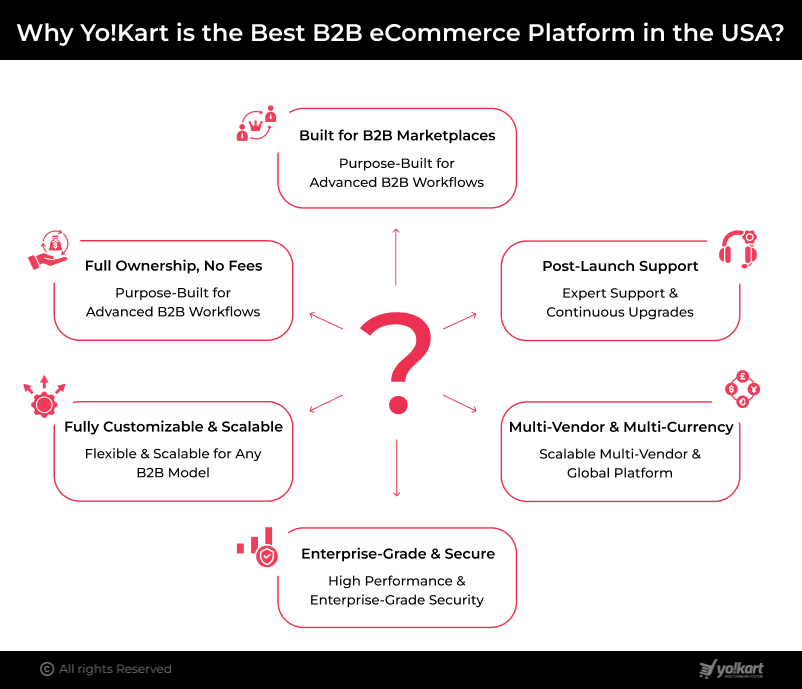
1. Built Exclusively for B2B Marketplaces
Unlike generic eCommerce systems that need heavy plugin dependencies, Yo!Kart is purpose-engineered for B2B transactions. Its core architecture supports complex features like:
- RFQ (Request for Quote) workflows for negotiated pricing
- Tier-based and volume-based pricing to encourage bulk buying
- Custom buyer groups and catalog visibility rules
- MOQ (Minimum Order Quantity) settings for wholesalers
- Corporate account management with multiple user roles
These features replicate real-world wholesale processes, enabling businesses to run digital operations exactly as they do offline, but faster and smarter.
2. 100% Ownership with No Recurring Fees
Most SaaS-based platforms charge ongoing monthly or transaction fees that eat into margins. In contrast, Yo!Kart follows a one-time licensing model, ensuring complete ownership of your B2B platform, which not only reduces long-term operational costs but also gives you the freedom to:
- Customize the system without SaaS restrictions
- Host it on your own server for enhanced data control
- Avoid vendor lock-ins and third-party dependencies
For U.S. enterprises focusing on data sovereignty and cost efficiency, Yo!Kart provides a future-proof solution.
3. Deep Customization and Scalability
B2B business models vary by industry; what works for a manufacturing marketplace may not fit a raw material supplier. Furthermoer, Yo!Kart’s open architecture allows extensive customization across workflows, design, and integrations.
Whether you want to integrate an ERP, build a private procurement network, or launch a multi-seller marketplace, Yo!Kart scales effortlessly with your vision.
4. Enterprise-Grade Performance and Security
Built on a strong technology stack, Yo!Kart ensures high performance, fast load times, and PCI-DSS-compliant transactions. Additionally, security layers include:
- SSL certification and data encryption
- Secure payment gateways
- Multi-level user authentication
- Regular code audits and system updates
For U.S. businesses handling sensitive client data and bulk transactions, Yo!Kart delivers enterprise-grade reliability.
5. Seamless Multi-Vendor & Multi-Currency Capabilities
Yo!Kart empowers you to onboard unlimited vendors while maintaining centralized administrative control. Each vendor can manage their own storefront, inventory, and pricing.
With multi-language and multi-currency support, it’s ideal for businesses aiming to serve both domestic and international buyers, all from one powerful B2B platform.
6. Dedicated Post-Launch Support
Yo!Kart is backed by a team of expert developers and B2B consultants who provide one year of free technical support and regular upgrades. This ensures your marketplace continues to evolve with emerging technologies and business needs.
Build Your Scalable B2B eCommerce Platform With Yo!Kart
Conclusion
The U.S. B2B eCommerce ecosystem is booming, creating vast opportunities for digital-first enterprises. Whether you’re looking to digitize wholesale operations or launch a large-scale B2B marketplace, the foundation of your success lies in the platform you choose.
While SaaS tools like Shopify Plus or BigCommerce offer quick setups, they fall short in ownership, flexibility, and long-term scalability.
For businesses that prioritize control, customization, and profitability, Yo!Kart is undoubtedly the best B2B eCommerce platform in the USA, empowering them to launch their marketplace with confidence and grow without limitations.
Frequently Asked Questions (FAQs)
Q 1. What is the best B2B eCommerce platform for startups in the USA?
Ans. Yo!Kart is the best choice for startups or entrepreneurs looking to build a B2B eCommerce platform. With its affordable pricing, full ownership, and built-in B2B modules, it is helping new businesses launch and grow efficiently.
Q 2. How much does it cost to build a B2B marketplace with Yo!Kart?Leverage the Best B2B eCommerce Software to Build Your
Ans. The cost to build a B2B marketplace with Yo!Kart depends on the addition and customization. However, Yo!Kart offers packages starting from around $999, making it cost-efficient for long-term operations with no recurring subscription or transaction fees.
Q 3. Can I customize my Yo!Kart marketplace?
Ans. Yes, Yo!Kart supports customization and offers complete access to the source code, which enables you to customize your marketplace as per your business model. Hence, you can customize design, workflows, integrations, and more.
Q 4. Does Yo!Kart support international B2B operations?
Ans. Yes, Yo!Kart supports international B2B operations. It supports multiple languages, currencies, and tax configurations, which makes it an ideal choice for businesses expanding across the globe.
Q 5. Is Yo!Kart suitable for enterprises?
Ans. Yes, Yo!Kart is suitable for enterprise-level businesses. Its modular architecture and enterprise-grade security make Yo!Kart a reliable solution for both growing SMBs and large enterprises.
